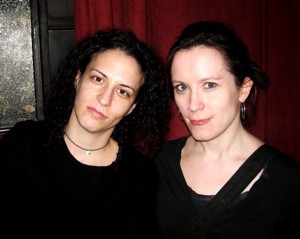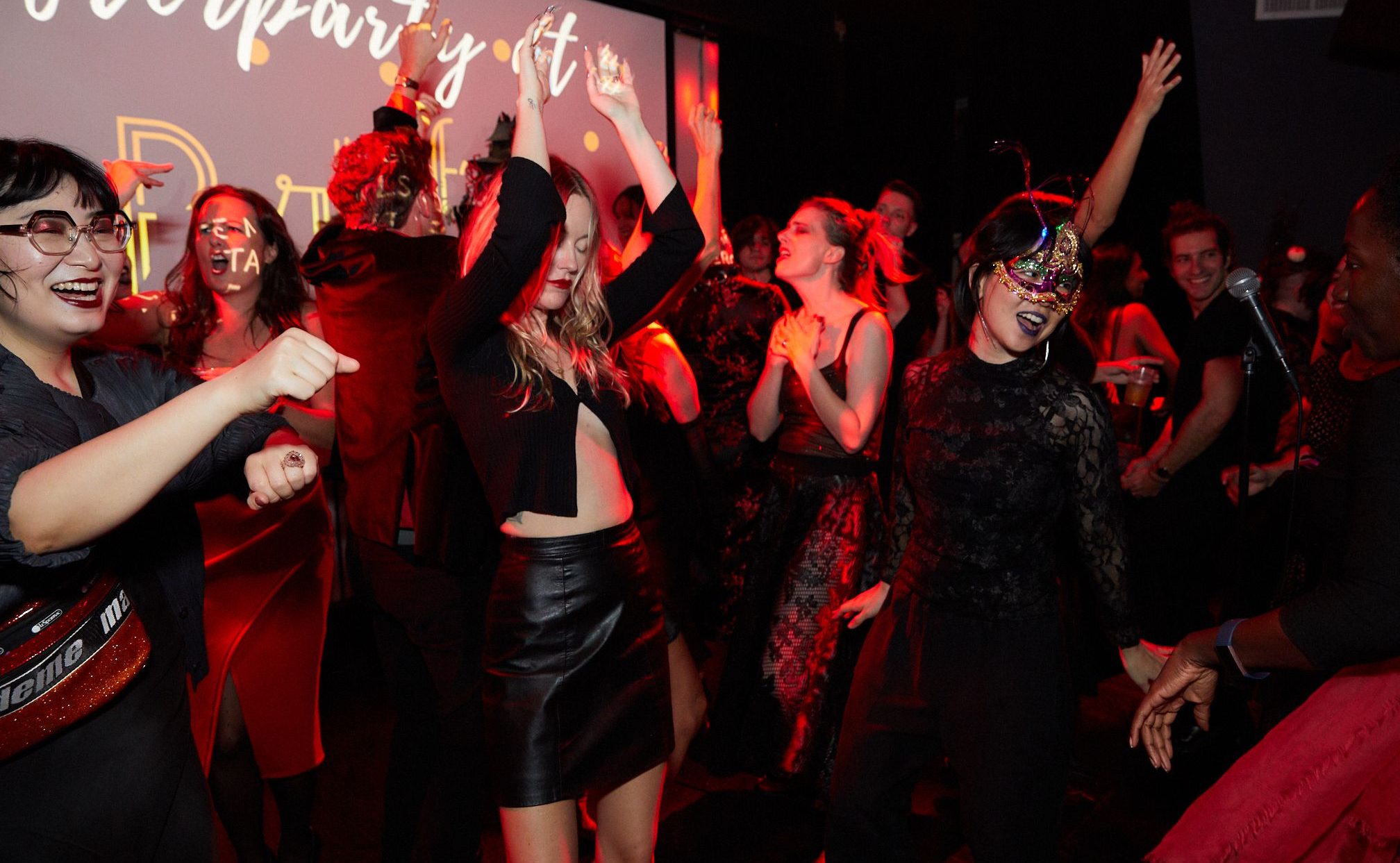news
Birthday Doom & Gloom at KGB

1. Eve & Ellen, who are both students at NYU. 2. Readers DéLana Dameron & Gabe Habash. Habash is also the editor-in-chief of The Washington Square Review.


Last night, I went out to KGB for their Emerging Writers series, featuring NYU MFA program students and author of Last Last Chance, Fiona Maazel. The last time I went to KGB, I arrived there late and the crowdedness of the bar gave me what I think may have been a mild anxiety attack, so this time I made sure to get there early so I could secure myself a seat. It worked: no anxiety attacks were suffered.
The order of the reading went Fiction Writer, Poet, Break x2, with Maazel reading after the second break. Blair Hurley went first, reading a section from her novel in which a woman converts to Buddhism from Catholicism. The excerpt features a scene in which the woman in question loses her virginity almost exactly like how I lost my virginity: outside, with a guy who doesn’t matter or care, and she likes it that way because her virginity is just something she wants to get rid of. Good stuff.
1. Jenna, a student, & Jarret, a mystery man, who came to cheer Habash on. 2. Steven, Stephanie, Ryan, & Brian. Steven and Ryan are both undergrad Fiction Writing students at Brooklyn College, Stephanie writes for babble.com, & Brian is a PhD candidate in Comparative Literature at the CUNY Grad Center.


Poet DéLana Dameron read three poems from her book, How God Ends Us. These poems, if you couldn’t tell from the title, are all about endings: death, break ups. She also read some newer poems, in which she explores the similarities between South Carolina, Dameron’s home state, and Harlem, the neighborhood where she currently resides. I was especially impressed by her last poem, titled “A Mother is Always,” about an event that Dameron had seen on a bus in Harlem: the bus was filled with dark-skinned women, save for one man who had a problem with his zipper, and the poem was moving and exquisitely crafted, managing to elevate the everyday occurrences of life into something transcendent. It was, in short, everything a poem should be. Abstract “S” word I would give Dameron’s use of language: Succulent.
1. Abba Belgrave, a poet, & Melissa Swantkowski, a fiction writer. Both are in their first year at the MFA program at NYU. 2. Reader Fiona Maazel & writer Therese Cox, who is currently shopping around her first novel, Dear Dirty Dublin. Someone should buy it and give her hella billz!


Habash was fiction writer #2 and read a story that no one had ever seen before. “So maybe it sucks,” he said. (It didn’t.) We heard about two siblings who found and adopted a baby lion, which had escaped from the circus. The lion goes on to eat the neighborhood pets, the kids speculate about the lion’s tiny nutsack (described as looking like their mother’s change purse — awesome description of balls #2 for the month), and hilarity ensued.
Richard Prins read poems about his favorite city in the world, Dar es Salaam (tied with New York), and the two cities that tied for third place, Cape Town and New Orleans, and Jesus. He is apparently a lot ballsier than I, because his final poem was dedicated to a lady friend and was very sexy. Ballsier not because of the subject matter, but because his mother was in the audience (she was sitting right next to me and appeared unfazed). Abstract “S” word I would give Prins’ use of language: Slinky.
1. Readers Richard Prins & Blair Hurley.

I was excited to hear Maazel’s work because she’s currently my workshop teacher and I’m pretty sure I adore her. After a rousing version of “Happy Birthday,” accompanied by a special birthday dance by Maazel (yes, it was her birthday), she read some “doom and gloom” from her forthcoming novel, Woke Up Lonely. She prefaced it by saying that there was a lot about North Korea in the book, because North Korea seems to have a lot of similarities to the cult she wanted to create. For research, she read On The Art of Cinema by Kim Jong Il, which featured advice on writing fiction. She shared some of his genius advice with us; the tidbits included things like “The seed is the core of literary work.”
The section that she read was about the protagonist, Anne-Janet, who had a) gotten raped by her father, b) had colon cancer, and now, c) got kidnapped by a cult. Even though she had just been kidnapped, she was mostly preoccupied with her crush, who had conveniently (for her, not for him) also just been kidnapped. True to her past work, the writing was in turn touching, funny, and brutally true.
–Julia Jackson is working on her MFA in fiction at Brooklyn College, and is a regular contributor for Electric Dish.









